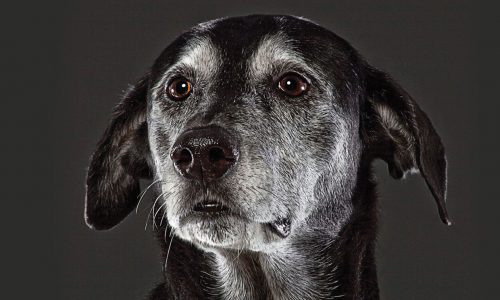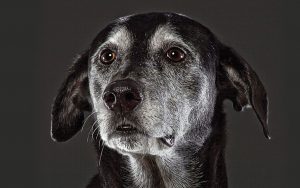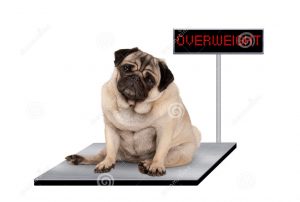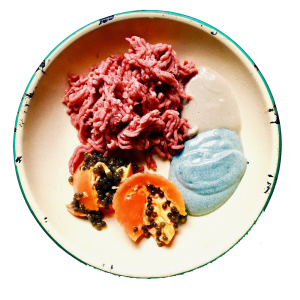Although there is a common belief that protein restriction is helpful for an older dog, there is little scientific evidence to show that low protein foods are beneficial for the healthy older dog or cat. In fact, foods highly restricted in protein may actually be too low in protein for many older animals and can contribute to muscle loss. Therefore, dogs and cats should not be fed a low protein diet just because they are old. If moderate to severe renal disease is present, then some protein restriction may be beneficial. The optimal protein level for older dogs and cats, however, is still controversial. Some companies manufacture senior diets with low protein, some have moderate protein, and some senior pet foods actually contain higher levels of protein than for younger adults. Ongoing research is required, but for older animals without significant renal or hepatic disease, it is not necessary to reduce protein in the diet.
Healthy older dogs need more protein than younger dogs. At the very least they don’t need protein restriction. Keeping in mind that it’s not only the amount of protein, but the quality of the protein that’s important. You can feed a lower quantity of a higher-biological-value protein and get the same nutrition.
In selecting the optimal diet for an older animal, the first thing to consider is overall health. If the animal is healthy, in good body condition and eating a good quality adult food, there is no reason to change foods. If the patient has one of the diseases often seen with aging such as arthritis, diabetes, cancer, dental problems, cardiac disease, or kidney disease, dietary adjustments may help improve clinical signs or even slow progression of the disease. For cats with chronic kidney disease, dietary modifications such as reduced phosphorus, avoiding acidifying diets, and omega-3 fatty acid supplementation may help to slow progression of the disease. Reduced sodium foods may be useful in dogs with congestive heart failure and can help reduce the diuretic dose required. The best diet should be the one based on the individual animal’s clinical signs, laboratory results, and stage of disease. As the disease progresses and medication adjustments are required, further dietary changes also may be necessary. Dietary modification can help to optimize health in the healthy dog and cat and to modulate disease as animals’ age.
So, what is the best nutritional approach for feeding senior and geriatric pet dogs and cats? In patients that are metabolically efficient, healthy and maintaining body weight and body and muscle condition, continuation of the diet they are currently eating is reasonable. In patients that are metabolically efficient, healthy, but gaining body weight and increasing in body condition, then caloric restriction and possibly feeding a higher fibre diet is required. Restriction of other nutrients, such as protein, at this time is not warranted. In patients that are metabolically inefficient but otherwise healthy and losing weight and body and/or muscle condition, feeding a more calorically dense and higher protein diet is indicated. In patients that are metabolically inefficient and not clinically healthy, dietary recommendations are directed towards modifying nutrients that impact upon the underlying disease.
Actual protein needs may vary based on individual factors, such as breed, lifestyle, health, and individual metabolism. In addition, calorie intake affects dietary protein need. With lower calorie intake, the percent of calories as protein must increase to maintain the same protein intake. Older dogs tend to consume fewer calories, and thus less food, than younger dogs. Therefore, diets for older dogs should contain a higher percentage of dietary protein, or an increased protein-to-calorie ratio, to meet their needs. Diets containing at least 25% of calories from protein should meet the protein needs of most healthy senior dogs
It appears that the research at this point seems to be advocating moderate levels of protein and other nutrients for the senior dog. Many of the pet food manufacturers’ senior products as well as their standard maintenance food seem to fall in this category. Therefore it would seem that if a given senior dog is healthy and thriving on a standard maintenance food there is no scientific reason to recommend a switch to a senior diet no matter how old the dog is. If a dog is doing well on a standard non senior food it should remain on it indefinitely.
Reduced protein digestion or fat digestion could contribute to weight loss in aging cats. A number of digestibility studies carried out with dogs confirm that there is no evidence of an age-related decline in digestive efficiency. This knowledge makes the determination of energy provision to senior dogs relatively straightforward to calculate. Many senior cats appear to exhibit quite a marked reduction in their ability to digest macronutrients, particularly fat, efficiently. Because this reduces the overall capacity to obtain energy from the diet, it is recommended that old cats should not routinely be offered reduced energy diets. For senior cats, the feeding regimen in later life should be to offer highly digestible diets that provide as much energy as adult maintenance rations.
As protein metabolism changes with age, pets begin to lose lean muscle mass, which is a serious issue. If they’re losing lean muscle mass when they’re 10, 12 or 13 years of age, they’re getting weaker and weaker. By the time they’re 13 to 15, cats can’t get in the litter box and may be weeing on the carpet, or the dog may struggle to go up the steps. So it’s really important to preserve lean muscle mass.
Keeping in mind that more than 40% of dogs between the ages of 5 and 10 years are overweight or obese, such dogs may benefit from diets with lower fat and calories. Senior dogs also have an increased need for dietary protein, however. Therefore, healthy older dogs may benefit from diets with an increased protein-to-calorie ratio, providing a minimum of 25% of calories from protein.
Protein is nutrient of extreme importance for aging pets. In the past, many veterinarians have recommended protein restriction for older dogs in the mistaken belief that this would help to protect kidney function. More recent research has unequivocally demonstrated that protein restriction is unnecessary in healthy older dogs. On the contrary, protein requirements sufficient to support protein turnover actually increase in older dogs.










